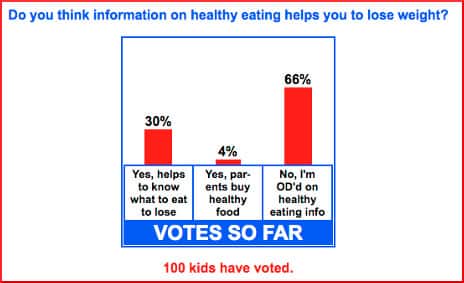
Yesterday, Childhood Obesity News spoke of the research efforts that are underway thanks to the Robert Wood Johnson Foundation (RWJF). As is fitting for a project that operates on a national scale, the two areas of concentration are effective policy and effective environmental strategies.
Of course those two areas overlap. Schools and grocery stores are both part of a child’s environment, but it might take some determined policy-making to bring about changes in them.
These factors are both very important for babies and young children, who have no choice or agency in their life circumstances. Teenagers are different. Adolescents possess considerably more autonomy than children. Coincidentally, the decision to adopt a healthy lifestyle also requires personal power. In many ways, this is good. It is difficult to prevent anyone from becoming obese unless they are personally on board with the idea.
A mixed blessing
The increase in self-determinism that comes with age has a downside. Neither environmental changes nor policy decisions can have as much effect. Ultimately, the battle to avoid or reverse obesity belongs to each person alone. To make a difference, hearts and minds need to change.
RWJF says that its Healthy Eating Research program aims to “build a vibrant, multidisciplinary field of research and a diverse network of researchers.” This almost sounds like it might be secret code for “Weirdness is welcome; we’ve tried everything else.”
Let’s digress for a moment and mention one of the terrific things about Dr. Pretlow’s Weigh2Rock website, the poll feature. Here’s a guy who goes to the source and actually asks kids what’s up. Take, for instance, Poll #85, which asked kids, “Do you think information on healthy eating helps you to lose weight?”
The young people responded:
Yes, it helps me to know what I should be eating, in order to lose weight: 30 votes (30%)
Yes, it makes my parents and school have healthy food for me to eat: 4 votes (4%)
No, I am OD’d on healthy eating info — I need info on resisting cravings: 66 votes (66%)
Have you learned healthy eating info in school?
YES: 61 votes (61%)
NO: 39 votes (39%)
What could be wrong with spreading healthy eating information via the school curriculum? Nothing, except that it apparently doesn’t make much of a dent in the problem. When RWJF seeks researchers, advocates, decision-makers, and policymakers to throw their support behind, the key word is “effective.”
When 66% of kids feel that they have absorbed a surfeit of healthy eating information, and most of them learned it in school, this does not inspire confidence in whatever it is the schools are teaching. Hopefully, no award-granting foundation will leap at the chance to subsidize, for instance, yet another reboot of the Food Pyramid.
A serious flaw in the emphasis on healthy eating information is that it ignores the real problem. Dr. Pretlow says:
The approach to child/adolescent obesity continues to be the “nice nice nice” healthy eating paradigm, even though kids say they are overdosed on healthy eating information, that it doesn’t help.
Obese kids say that they need help resisting cravings, which suggests an addictive process is behind their overeating/obesity.
A certain variety of folk wisdom holds that “It’s not what you eat, it’s what you don’t eat.” A more succinct, if paradoxical, way to express the same thought is, “You are what you don’t eat.” This is why, rather than healthy eating information, Dr. Pretlow’s W8Loss2Go program focuses on the child’s problem foods — the ones that are most likely to be addictive — and on ditching them one at a time.
Sure, eating fruits and vegetables is very important. But even more important is not eating chips, cheese, chocolate, or whatever other addictive foods are holding that young person in the prison of obesity.
Your responses and feedback are welcome!
Source: “About Us,” healthyeatingresearch.org, undated
Image by Weigh2Rock

 FAQs and Media Requests:
FAQs and Media Requests: 











